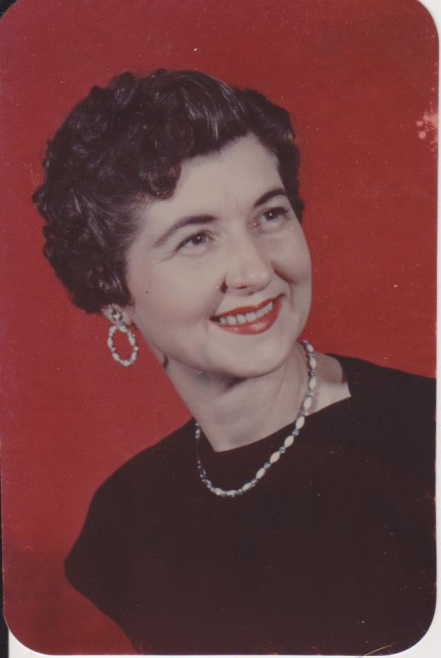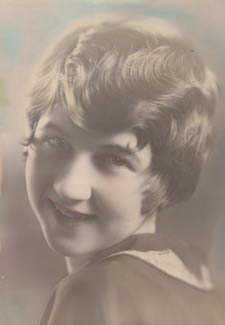

Our Farm Stays – The Vaughn Room
by Barbara Goodrich
When Dan and I first had the idea of Farm Stays, we learned that the county allowed up to eight interior rooms, and I thought “why not name each room after a grandparent?”. After all, we are here because of them, and what a great way to keep their memories alive. I did not get a chance to meet all my grandparents, but my folks were always so good about telling stories about them, I feel like I knew them all. And they all had amazing lives: from a dentist to Kaiser Wilhelm II to an inventor. But the only one I met, was a coal miner’s daughter from Colorado, who grew up to raise a family of three girls, and live as one of the “Greatest Generations” – Gay Vaughn Riley.
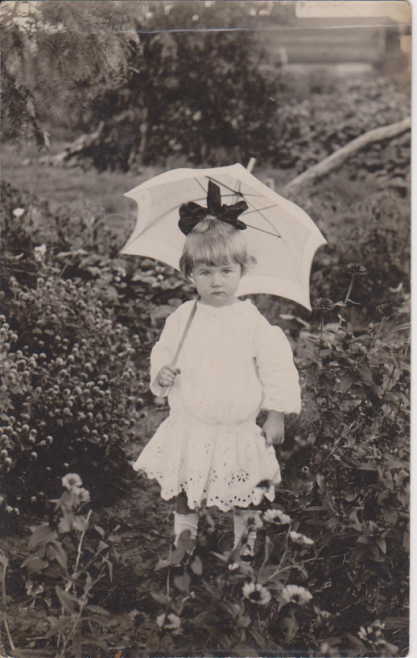
| Gladys at age 2. Circa 1914 |
Gay was born ‘Gladys Calfernia Vaughn’ to Thomas and “Willie” in 1912. She was the fifth of six children. The Vaughn family began in Sebastian, Arkansas, November 25, 1899. Thomas Newton Vaughn married Susanna Carmen “Willie” Anderson. A little less than nine months later, they welcomed their first child: Zella Novella. Now, this does not mean that Thomas and Willie got married to “make it honest”, nor does it mean that Zella was a premature baby. Back in those days, living way out in the sticks, many times, a pastor only came through town every few years. So some folks might start their family, then wait to make it official once it was officially practical. According to a 1900 census, Thomas worked as a farm laborer in the Choctaw Nation of Indian Territory (Oklahoma). Between 1903 and 1911 they have three more children: James, Earl, and William. Sometime in between Earl and William, a baby girl, Flossie, was born. She died two weeks later. Willie was sure the baby caught pneumonia from being bathed in front of a window. In 2008, genetic testing reveals a genetic defect (on Barbara’s side for Cystic Fibrosis. This could have easily been diagnosed as pneumonia in those days. In 1911, the family moves to Texas. In 1912, Thomas and Willie welcome Gladys Calfernia to their family; this is Barbara’s maternal grandmother. In 1916, Penelope was born (the baby of the family). In 1918, the family moves to Colorado. Thomas, went to work as a machine man for the Colorado Fuel & Iron Company. He drove a big drilling rig which drilled the mine, as construction workers built the frame work behind him. The Ludlow Massacre had occurred right before the family arrived, so conditions may have improved slightly, but life was still hard. The miners would haul out the ore by the cart load and be paid according to the quality and weight. The family lived in a small mining camp near the Upper Berwind Mine, in a one room cabin, with an outhouse. The community was quite diverse, with families of all different backgrounds living as neighbors. Gay spoke fondly of those days, and of her loud and boisterous Italian neighbors, who made “a big to do” when she came to visit. The father would yell “Oh Mamma, put the kettle on! It’s Ms. Vaughn! Miss Vaughn is here for a visit!” She felt so welcome and grown up. On Wednesday, April 14, 1920, Thomas was not scheduled to work. But, the men in the Toller mine needed a machine man to drill. He told his wife, if he didn’t go in, those men would not be able to work, and therefore, not get paid. Times were tough, and those men needed the money to feed their families. His drill hit a soft spot, and the mine collapsed, killing Thomas. He left behind his wife and six children. The youngest child, Penny, was four years old. Gladys was eight years old. Years later, she would talk about his death. She did not remember being his favorite girl, or sitting on his lap while he played piano. Everything she knew about him, she was told by her family. The only thing she remembered was being lifted up to his open casket and thinking “oh there he is!”, but when she kissed his cheek, he was so cold, and not himself, she said it was like a curtain was pulled over every memory she ever had of him.
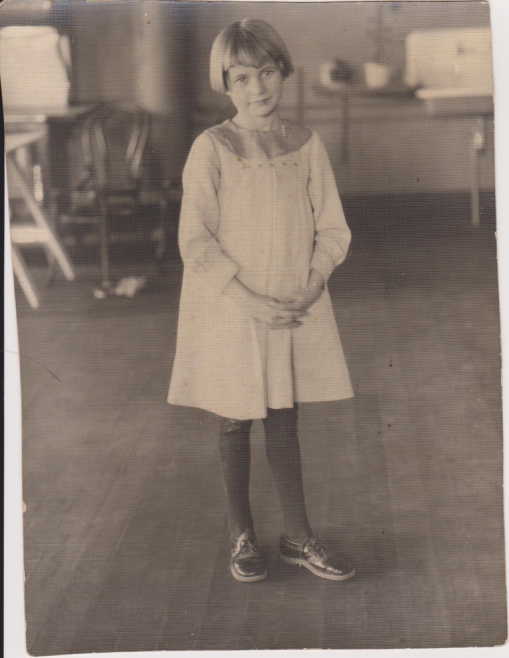
| Gladys at age 8. Circa 1920 (a “look Ma, I cut my own bangs” moment) |
After Thomas’ death, the boys in the family went to work in the mine, and farming, to support their mother and younger siblings. Gladys gets through school, and even attends college. As soon as she turned 18, Gladys legally changed her name to Gay Carman Vaughn (she was tired of her brothers’ calling her “Happy Bottom”).
Gay wanted to be a lawyer, and a judge, but the dean of the college told her she “shouldn’t worry her pretty little head about such things”, so she went to school to be a legal secretary and stenographer (court reporter). In those days, court reporting was done in short hand, and Gay was one of the best. She learned to type and could type 100 words per minute on those old keyed typewriters. She won awards for her typing speed.
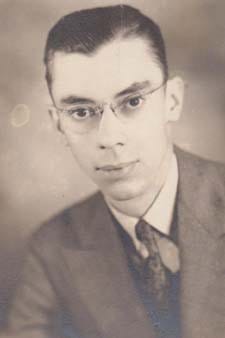
| Curtis Robert Riley. |
While in college, she met Curtis Riley, a tall, dark, and handsome young man, going to school for business and engineering. They were smitten and wanted to marry, but in those days, once a woman was married, she was expected to leave her job and start a family. Since they needed both incomes, Gay and Curt eloped and stayed married in secret for a while. They were married in Colorado in 1932. After enough time, she put aside her business school training and set up house in Denver. Her daughters Diane Gay, and Barbara Rae were born in 1934 and 1937. Curt’s engineering career brought the family to Westwood, California in 1944. He worked for Lockheed, and worked on inventions in his spare time. Curt invented the Rilex, one of the first light-weight aluminum cameras. He sold about 500 of them. Gay said she could “fold those damn billows in her sleep”. Once Kodak came out with their aluminum cameras, the Rilex lost it’s appeal. And Curt moved on to other inventions: a surround sound system for the living room, a golf club. Their daughter, Kathleen Penelope (Barbara’s mother), was born in 1949.
In 1956, Gay and Curtis moved with their youngest daughter Kathleen to Rolling Hills Estates. Gay wanted to help the school community and put her early training to be a court recorder to work. She was the very first employee of the newly unified Palos Verdes Peninsula Unified School District. Her stenographic and editing skills proved useful and she was asked to be the official secretary to the School Board. Gay traveled the distance to Crest Road late on Board meeting nights to capture the concerns of only four elementary schools, Malaga Cove, Miraleste, Valmonte and Dapplegray. Gay was grateful for the opportunity to be an observer, “seeing all the sides of an issue, the administration’s and the public’s.” At the second school board meeting, when Gay turned in her 100 page report of the first meeting, she was told that, perhaps, she did not need to write in such great detail, and to keep the meeting minutes to only a few pages.
Curt and Gay had planned to retire in 1970 and travel the country in a Winnebago. Unfortunately, he was diagnosed with pancreatic cancer and died in 1969; Gay never re-married. She continued to work until 1974. The day Gay retired in 1974 was officially named “Gay V. Riley Day”. When she retired, she moved to Malibu with her daughter, Kathleen, and son-in-law, Richard Hartley. She enjoyed the next three decades with them and their five children. Gay lived for her children and grand-children. She always kept a “Sugar Bowl” contingency fund to help them with educational trips to China, Great Britain, Peru, and Croatia, loans for their businesses, and even first cars. She was very conservative with her money, and lamented that she wasn’t more of a risk taker. Her grand-children, however, had no problem being risk takers, and Gay helped to fund their dreams. When her grandson, Curtis, wanted to start his injection molding business, Gay was there with a $20,000 loan to fund it. His company, now OtterBox and LifeProof, are two of the largest manufacturers of protective cases for electronics.
Gay passed peacefully away January 16, 2007 at the generous age of 94 years. In her lifetime she experienced the new age of automobiles, man’s landing on the moon, the invention of toilet paper, and the vast expansion of the Internet to nearly every home. (The first computer she ever saw encompassed en entire building at UCLA.)
When Gay passed away, she left her accumulation of oil and mineral rights to Barbara, who worked as the executer of her will. The income from those rights have helped us to build this farm. Gay was always supportive of Barbara’s business endeavors, and I know she would be proud to have been a part of building this business.
